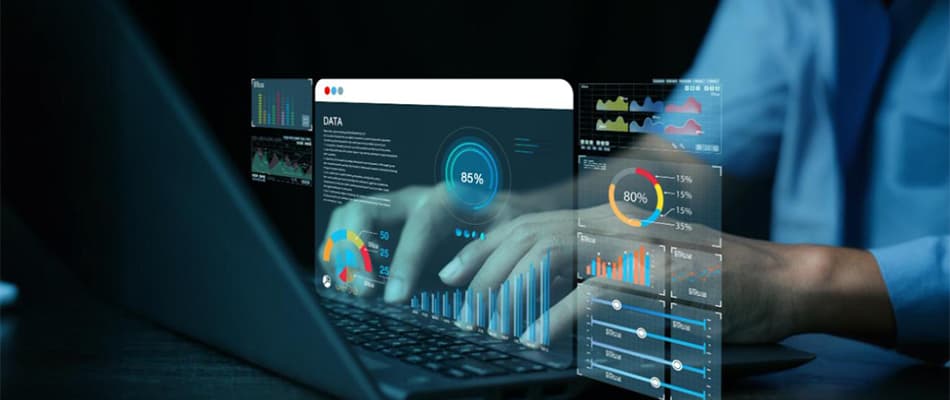How To Become A Data Scientist: Complete Roadmap for Data Scientist Career
A data scientist is a professional who uses statistical, mathematical, and computational techniques to analyse and interpret complex data sets in order to make informed decisions. This role is essential in today’s data-driven world, where vast amounts of information are generated every second. Data scientists help organisations make informed decisions by uncovering hidden patterns, predicting trends, and providing actionable insights.
Data scientists are an important profession for the different sectors in all industries, including healthcare, finance, marketing, and technology, where, through their know-how, companies can streamline processes and improve customer experiences, as well as enhance growth through innovations. There is always an increased need for competent data scientists as long as we have more information than we can handle; thus, this career path is highly beneficial but still challenging. In this article, how to Become a Data Scientist, you can learn about how to be a data scientist, the steps to become a data scientist, skills & eligibility and the benefits of the Data Science course offered by Digital Regenesys.

What is a Data Scientist?
In simple terms, data scientists act as data interpreters who bridge the gap between data and actionable business strategies. They are proficient in programming, machine learning, and data visualisation, which enables them to handle large datasets and uncover trends and patterns that are not immediately apparent. Their work is crucial in transforming data into a strategic asset for companies.
They play a key role in helping organisations understand and utilise their data to solve complex problems. By combining technical skills with domain knowledge, data scientists can turn raw data into meaningful information that supports decision-making processes.
What Does a Data Scientist Do?
A data scientist analyses complex datasets to extract meaningful insights and solve business problems. They collect, clean, and organise data, apply statistical and machine learning techniques, and create visualisations to communicate findings. Data scientists collaborate with cross-functional teams to implement data-driven solutions, optimise processes, and drive strategic decisions, ensuring that organisations can leverage their data effectively. Some of the essential roles of a Data Scientist is as follows:
- Data Collection: Data scientists gather data from various sources, ensuring it is relevant and accurate for analysis. They often use web scraping tools, APIs, and databases to collect this data.
- Data Cleaning: It involves preprocessing data to remove any inconsistencies or errors, making it suitable for analysis. Data scientists use tools like Python and R to clean and prepare data.
- Data Analysis: They apply statistical methods to analyse data and extract meaningful insights. This step often involves identifying trends, patterns, and correlations within the data.
- Data Visualisation: Data scientists create visual representations of data, such as charts and graphs, to communicate findings effectively. Tools like Tableau and Power BI are commonly used for this purpose.
- Machine Learning: They develop and implement machine learning models to predict outcomes and automate decision-making processes. These models help in tasks like classification, regression, and clustering.
- Predictive Modelling: This particular function involves building models to forecast future trends based on historical data. Predictive modelling is essential in fields like finance and marketing.
- Statistical Analysis: Data scientists use statistical techniques to validate hypotheses and make data-driven decisions. This can involve tests like regression analysis and hypothesis testing.
- Programming: Data scientists must be proficient in programming languages like Python, R, and SQL. These languages are used for data manipulation, analysis, and model development.
- Big Data Technologies: They work with big data tools like Hadoop and Spark to handle and process large datasets efficiently. These technologies are vital for managing the scale of data in today’s world.
- Data Warehousing: Data scientists design and maintain data warehouses to store and manage large volumes of data. This ensures data is organised and easily accessible for analysis.
- Database Management: They manage databases, ensuring data integrity and optimising performance. SQL is often used for querying and managing databases.
- Collaboration with other teams: They work closely with other teams, such as marketing, finance, and product development, to understand their data needs and provide insights. Effective communication is key in these collaborations.
- Data Governance: Ensuring data privacy and compliance with regulations is a critical role. Data scientists help implement data governance policies and procedures.
- Doing A/B Testing: They design and conduct A/B tests to evaluate the impact of changes or interventions. This helps in optimising business processes and strategies.
- Algorithm Development: Data scientists develop algorithms to automate tasks and improve efficiency. These algorithms can range from recommendation systems to fraud detection models.
- Reporting: Creating detailed reports to present data findings to stakeholders is an essential task. These reports often include visualisations and actionable insights.
- Ethical Data Use: Ensuring the ethical use of data and maintaining user privacy are key responsibilities. Data scientists must be aware of ethical considerations and best practices in data handling.
- Project Management: They manage data projects from conception to completion, ensuring they meet objectives and deadlines. This requires strong organisational and project management skills.

Skills Required to Become a Data Scientist
A data scientist needs both technical and analytical skills. Data processing and analysis require proficiency in computer languages. A strong understanding of statistics is essential for analysing data and developing models. Anyone who wants to become a data scientist without a degree can also look for an online course. Additionally, knowledge of machine learning, data visualisation tools, and big data technology is required for extracting insights and managing enormous datasets.
- Knowledge of Programming: Proficiency in Python and R is essential for data manipulation and analysis. These languages offer extensive libraries for data science tasks.
- Skills of doing Statistical Analysis: Understanding statistical methods is crucial for analysing data and validating results. This includes knowledge of probability, regression, and hypothesis testing.
- Know about Machine Learning: Skills in machine learning allow data scientists to build predictive models and automate decision-making processes. Familiarity with algorithms and tools like TensorFlow is important.
- Data Wrangling: The ability to clean and prepare data for analysis ensures accuracy and reliability. This involves handling missing values, outliers, and data inconsistencies.
- Good experience with Data Visualisation skill: Creating visual representations of data helps communicate insights effectively. Tools like Tableau and Power BI are commonly used for this purpose.
- Big Data Technologies: Knowledge of big data tools like Hadoop and Spark is necessary for managing and processing large datasets. These technologies help in handling the volume and complexity of data.
- Communication Skills: Strong communication skills are needed to present data insights to stakeholders effectively. This includes creating easy-to-understand reports and visualisations.
- Excellent with Project Management skills: Managing data projects from start to finish requires organisational skills and the ability to meet deadlines. This involves coordinating with teams and ensuring project objectives are met.
The skills mentioned above are required for becoming a data scientist. Moving on to the question “what do I need to become a data scientist such as eligibility criteria will be covered in the next section.

Data Scientist Qualifications and Eligibility Criteria
Data Scientists require different knowledge & experiences. Some candidates also pursue Advanced degrees, such as a master’s or PhD, which might provide a competitive advantage. Also, note that strong analytical skills, knowledge of programming, and a thorough understanding of statistical approaches are required. Hands-on experience gained through internships or projects is highly important, as well as constant learning to keep up with the latest trends and innovations.
The eligibility criteria to become a data scientist is as follows:
- A bachelor’s degree in computer science or IT related field.
- Understanding of statistics and probability
- Knowledge of machine learning algorithms and techniques via online platforms
- Ability to create data visualisations using tools like Tableau or Power BI.
- Familiarity with big data tools (e.g., Hadoop, Spark) through online training
- Skills in SQL and database management
- Strong problem-solving and critical thinking skills
- Effective communication and business acumen
The eligibility mentioned above criteria can help & clear their query on “how do i become a data scientist”. Along with this, you can also learn about the average salary of data scientists in the next section.
Explore our other courses
Average Salary of a Data Scientist
The average salary of a data scientist varies depending on experience, location, and industry. In the United States, data scientists typically earn an average annual salary ranging from $95,000 to $130,000.
Entry-level positions may start around $85,000, while experienced data scientists and those in senior roles can command salaries well over $150,000. Factors such as advanced degrees, specialised skills, and industry demand can influence salary levels, making data science a lucrative career choice.
Become a Data Scientist with Digital Regenesys Data Scientist Course
The Digital Regenesys Data Scientist Course will help you get started on your data science journey by providing you with the knowledge and skills you need. This extensive course provides access to state-of-the-art tools such as Power BI, Tableau, and technology, as well as expert mentoring and practical experience. Personalised learning pathways, real-world projects, internationally recognised certification, professional networking opportunities, and ongoing support to ensure your better future.

How To Become A Data Scientist –FAQs
What educational background is needed to become a data scientist?
A bachelor’s degree in computer science, statistics, mathematics, or a related field is typically required. Advanced degrees, such as a master’s or PhD, can provide a competitive advantage.
How to become a data scientist from scratch?
To become a data scientist from scratch you need to start by learning the fundamentals of statistics and programming, focusing on languages like Python or R. Then, gain hands-on experience with data manipulation, machine learning algorithms, and data visualisation through online courses and projects.
What are the primary responsibilities of a data scientist?
Data scientists collect, clean, and analyse data, develop machine learning models, create data visualisations, and provide actionable insights to support decision-making.
How to become a good data scientist?
A good data scientist should have a strong foundation in statistics, programming (especially in languages like Python or R), and data manipulation. Knowledge of machine learning algorithms, data visualisation techniques, and domain-specific expertise is also crucial. Additionally, good communication skills are essential for explaining complex results to non-technical stakeholders.
What industries employ data scientists?
Data scientists are employed across various industries, including healthcare, finance, technology, retail, and marketing, where they help optimise operations and drive innovation.
How can I gain practical experience in data science?
Practical experience can be gained through internships, real-world projects, research, online courses, and participating in data science competitions can also be helpful.
Which programming languages are essential for data scientists?
Proficiency in Python and R is crucial for data manipulation, analysis, and machine learning tasks.













